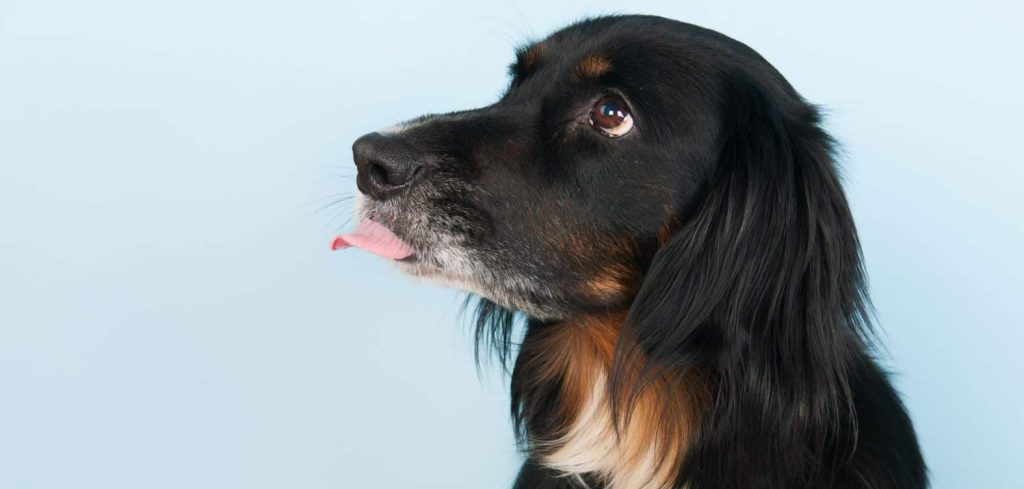Dogs pant for many reasons, but when panting is paired with foul-smelling gas, it can be a sign of an underlying issue that needs attention.
While occasional gas is normal, persistent flatulence combined with heavy breathing may signal digestive trouble or a more serious health condition.
We outline the common reasons for dog panting and bad gas, what you can do at home, and when to seek veterinary help.
Dog Panting and Bad Gas — Why It Happens
Dog panting and bas gas or excessive gas often point to gastrointestinal upset, dietary sensitivities, or systemic illness. Digestive issues, such as food intolerance or poor-quality diets, can cause gas to build up in the intestines, making your dog uncomfortable and more likely to pant from distress.
Stress, heat, or pain from bloating can also increase respiratory rate. In some cases, underlying conditions like pancreatitis, gastrointestinal obstruction, or even metabolic disease can present with these combined symptoms.

Dog Panting and Bad Gas: Common Causes
Food Intolerance or Poor Diet
When a dog consumes food that doesn’t agree with their digestive system, undigested ingredients can ferment in the gut, producing excessive gas.
Panting may occur if your dog feels abdominal discomfort or bloating.
Owners might notice diarrhea, a change in appetite, or rumbling stomach noises.
This issue can be serious if left unaddressed, as ongoing inflammation in the gut can lead to nutritional deficiencies and chronic digestive problems.
Read more: Dog Panting and Backing Up (Here’s why)
Ingestion of Spoiled or Non-Food Items
Dogs are naturally curious, and eating spoiled food, garbage, or foreign objects can cause both digestive upset and gas.
Panting may arise from nausea, abdominal pain, or even fever if infection develops.
This situation can escalate quickly if the ingested material causes intestinal blockage, leading to severe bloating and breathing difficulties.
Prompt veterinary care is crucial if your dog also shows vomiting or lethargy.
Gastric Dilatation-Volvulus (Bloat)
Bloat is a life-threatening emergency where the stomach fills with gas and can twist on itself.
This traps air and prevents blood flow, causing extreme pain, panting, and restlessness.
Owners may notice a distended belly, drooling, and unsuccessful attempts to vomit.
Gas is a hallmark of this condition, but the danger comes from the twisting of the stomach, which requires immediate surgery.
Pancreatitis
Inflammation of the pancreas can disrupt digestion, leading to foul-smelling gas and abdominal pain. Dogs with pancreatitis may pant due to pain or fever.
Symptoms often include vomiting, diarrhea, and a hunched posture.
This condition can be triggered by high-fat meals or certain toxins, and without treatment, it can become life-threatening.
Stress or Anxiety
Emotional distress can cause changes in breathing and digestion. A stressed dog may pant excessively, swallow air, and develop temporary gas.
While not as dangerous as bloat or pancreatitis, chronic stress can harm your dog’s overall health and may mask other underlying medical conditions.
Parasites or Gastrointestinal Infections
Worms, bacterial overgrowth, or viral infections can lead to poor digestion, gas production, and discomfort.
Panting may be a result of fever, abdominal cramps, or dehydration.
These conditions can spread quickly among pets and require prompt diagnosis and targeted treatment.
What to Do If Your Dog Is Panting and Has Bad Gas
If your dog seems otherwise bright and alert, you can start by evaluating their recent diet and possible access to garbage or foreign objects.
Offering a bland diet, such as boiled chicken and rice, for a short period can help soothe the digestive system.
Make sure your dog has constant access to fresh water to prevent dehydration.
Reducing high-fat and highly processed foods can also lessen gas production.
Keep your dog calm and avoid vigorous activity immediately after meals to reduce the risk of bloating.
Monitor closely for additional symptoms, including vomiting, diarrhea, or worsening breathing.
If symptoms improve within 24 hours, you can slowly reintroduce their regular diet, but if issues persist, seek veterinary care.
When to Call or Visit Your Vet
You should contact your vet immediately if your dog is panting and has bad gas along with:
- A swollen or hard abdomen.
- Repeated unproductive attempts to vomit.
Severe lethargy or collapse. - Persistent vomiting or diarrhea.
- Signs of pain such as whining, restlessness, or refusing to lie down.
Even if your dog is stable, persistent bad gas combined with panting warrants an examination to rule out chronic gastrointestinal disorders or metabolic issues.
Read more: Dog Panting and Bad Breath (What it means)
Key Takeaway
Panting and bad gas in dogs may seem minor at first, but together they can indicate anything from mild digestive upset to life-threatening emergencies.
Observing your dog’s behavior, appetite, and other symptoms will help you determine if it’s safe to monitor at home or if veterinary care is needed.
By acting quickly when symptoms are severe or persistent, you can help keep your dog comfortable, healthy, and safe.
